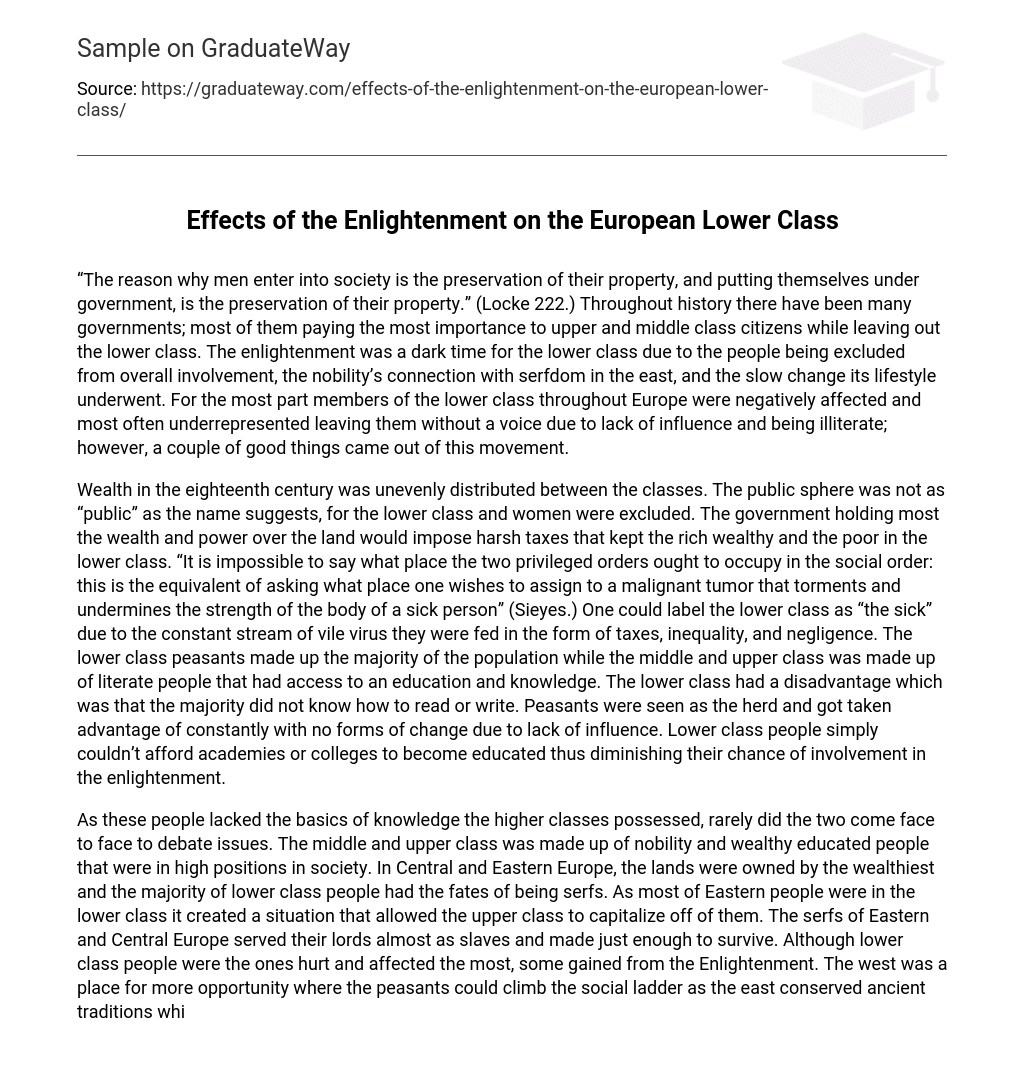“The reason why men enter into society is the preservation of their property, and putting themselves under government, is the preservation of their property.” (Locke 222.) Throughout history there have been many governments; most of them paying the most importance to upper and middle class citizens while leaving out the lower class. The enlightenment was a dark time for the lower class due to the people being excluded from overall involvement, the nobility’s connection with serfdom in the east, and the slow change its lifestyle underwent. For the most part members of the lower class throughout Europe were negatively affected and most often underrepresented leaving them without a voice due to lack of influence and being illiterate; however, a couple of good things came out of this movement.
Wealth in the eighteenth century was unevenly distributed between the classes. The public sphere was not as “public” as the name suggests, for the lower class and women were excluded. The government holding most the wealth and power over the land would impose harsh taxes that kept the rich wealthy and the poor in the lower class. “It is impossible to say what place the two privileged orders ought to occupy in the social order: this is the equivalent of asking what place one wishes to assign to a malignant tumor that torments and undermines the strength of the body of a sick person” (Sieyes.) One could label the lower class as “the sick” due to the constant stream of vile virus they were fed in the form of taxes, inequality, and negligence. The lower class peasants made up the majority of the population while the middle and upper class was made up of literate people that had access to an education and knowledge. The lower class had a disadvantage which was that the majority did not know how to read or write. Peasants were seen as the herd and got taken advantage of constantly with no forms of change due to lack of influence. Lower class people simply couldn’t afford academies or colleges to become educated thus diminishing their chance of involvement in the enlightenment.
As these people lacked the basics of knowledge the higher classes possessed, rarely did the two come face to face to debate issues. The middle and upper class was made up of nobility and wealthy educated people that were in high positions in society. In Central and Eastern Europe, the lands were owned by the wealthiest and the majority of lower class people had the fates of being serfs. As most of Eastern people were in the lower class it created a situation that allowed the upper class to capitalize off of them. The serfs of Eastern and Central Europe served their lords almost as slaves and made just enough to survive. Although lower class people were the ones hurt and affected the most, some gained from the Enlightenment. The west was a place for more opportunity where the peasants could climb the social ladder as the east conserved ancient traditions which stalled progression of society. As a result of the shift of serfdom towards Central and Eastern Europe, people in the west were given opportunities previously unavailable for their social group. Western Europe was cleared of serfdom and the lower class was allowed to own and rent land.
A major role played in making the enlightenment possible was the growing public opinion and toleration for one’s own opinion. It was common to see people of higher classes often gathered discussing thoughts and debating ideas around pubs, while the lower classes were excluded from these reunions. For example, in France, men and women would gather in salons and coffee houses around town to share knowledge. The exclusion of lower classes within these circles of enlightened thinkers caused a halt in the information and news the majority of the public should have been aware of. Due to the limitations these people faced, the cycle of ignorance and knowledge deficiency repeated itself generation after generation as those without education would continue to grow in numbers while those with an education decreased. Although opportunities for the lower class opened up in Western Europe, not everyone had the same luck around the other sides. Since the majority of the population belonged to the lower class, they relied on the upper classes for land and necessities such as food to insuring their survival, even if the cost was synonymous with slavery.
All in all, the enlightenment did not provide equal progression for the lower class as it did the upper class. Although it cannot be denied plenty of lower class Europeans suffered through the enlightenment era of the eighteenth century, various people benefited from the opportunities that arose in numerous regions of Europe. The West and East were as opposite as their locations and the change it brought to each of its lower class’ citizens could not have been more evident. The overall outcome of the enlightenment can be interpreted in numerous ways, although, the only thing evident is that no matter what part of Europe you were in, the struggle was constantly ongoing; whether climbing up the social latter or trying to make ends meet.





